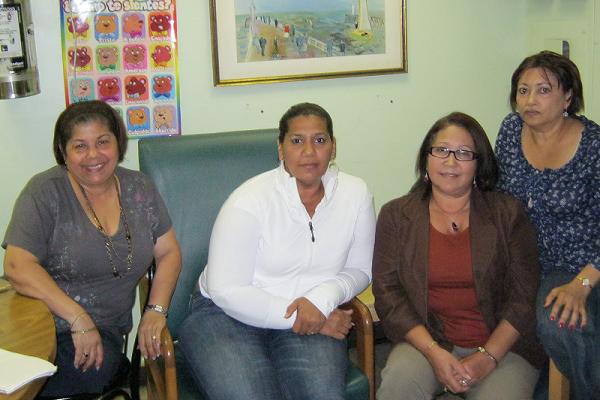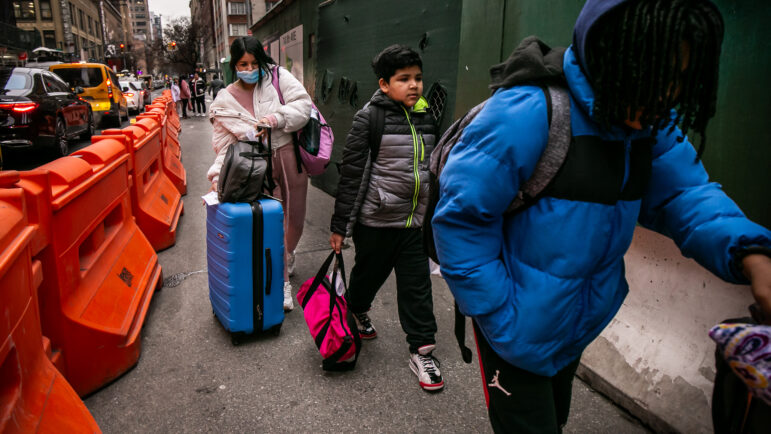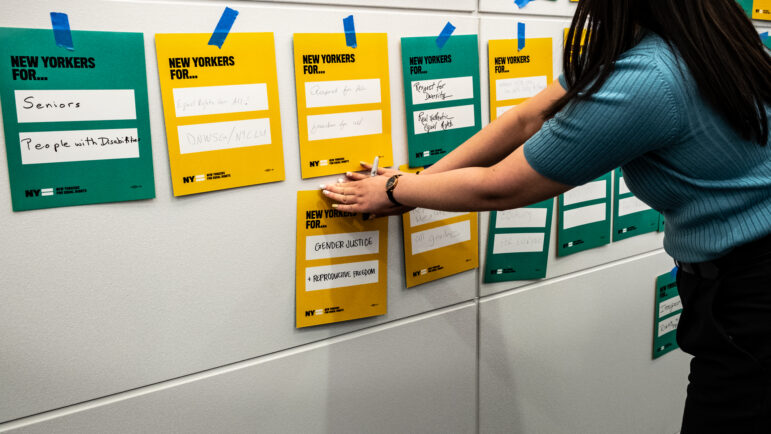
Photo by: Charu Sudan Kasturi
Workers at Alianza Dominicana.
I read with much sadness and concern Charu Sudan Kasturi’s article “Workers, Kids Suffer in Corruption Probe’s Aftermath.” The sadness is over the circumstances which have driven a group of committed employees to take a stand, albeit mistakenly, against Alianza Dominicana, the very institution which supports. They missed the target! Instead of attacking Alianza and threatening to sue the agency, we should all unite to change a city policy and a practice which is responsible for the situation they are facing. I am referring to a policy that independent of the specific facts in a case treats individuals accused or merely suspected of wrongdoing as if in fact they are guilty even before an investigation is completed. Sadly, if the evidence does not support the presumption of guilt, punitive steps are often followed by a “fishing expedition” in search of something, anything, that can justify the actions at the expense of justice.
In the case of Alianza, the city initiated an investigation in 2009 presumably on the basis of allegations of corruption made against its leadership by apparently powerful individuals with ties to our community whose motives are still unknown. Two years later the investigation has produced two reports without any findings that would support illegal activity. In the process the agency has been left in a deepening crisis. Innocent people have been harmed, vital community services are in jeopardy and reputations have been damaged.
In the spring of 2010, a year into the investigation and close to four years after the matter under investigation, contractual payments began to be severely delayed. By the time DOI released a report of its investigation on July 15, 2010, fifteen days into a new fiscal year, payroll and payments to vendors had been delayed for several months. The agency went into a deep crisis; a crisis created by these actions.
The staff was driven to desperation. The management of the agency would receive daily reports of staff that were facing eviction notices, canceling vacations, unable to feed their families, unable to report to work because they did not have money for transportation, and so on. This information was communicated to the City by Alianza and by staff directly who made repeated calls to various City officials for help. Yet, the decision had been irrevocably made as a matter of practice that the organization had to endure “collective punishment” even though the target of the investigation clearly did not involve everyone connected with the agency.
Two thousand and seven was a very difficult year for Alianza. The furious growth of previous years since the attack on the World Trade Center, the Flight 587 crash tragedy in our community just two months after the attack, the inequity in public financing of nonprofits, the known refusal of governmental sources to fund administrative costs, years of the “do more with less” mantra, and a major disruption of its accounting operations challenged the agency’s board and management unlike ever before. We did not however, face the situation alone. We reached out to our major partners in City and State government, our funders and supporters in the philanthropic community, changed fiscal managers, re-established internal controls, launched a $30 million construction project and raised $3 million dollars privately over the next three years in order to save the agency. Again, and in the face of this gargantuan effort to save the agency, the accusation of “self dealing” is unjustified. Why the City’s report made no mention of these efforts and accomplishments and was so intent on producing an unbalanced report of the facts is incomprehensible and inexcusable.
This past year has been very painful for the agency. Barely recuperating from the crisis created by the delays in payments and contract executions in July of 2010, the negative publicity effectively buried the agency’s annual fundraising event and nearly killed the construction project and the entire agency in the process. The negative publicity forced a major funder of the new construction project to withdraw $3.8 million, severely damaging the agency’s newest venture, the launch of the Afro Quisqueya Cultural Center. To add harm to injury, inexplicably, once again DOI delayed contractual payments and the timely execution of the agency’s contracts this past July to the frustration of City and State funders who have been working closely with the leadership of the organization to normalize its operations. This ill-advised action borne out of some nonsensical policy or practice, predictably exacerbated the agency’s financial position and inflicted more “collective punishment.” This is the reason day care and other employees at Alianza are still behind in salary payments.
The dedicated employees of Alianza are not a public burden. Like many other public servants on the community front, they play a vital role in maintaining the well-being of our city. They report to work every single day in the service of others during the worst economic downturn in the world since the Great Depression. They provide a vital service to children, youth and working families and to the City of New York. They are critical to the very sustainability of the Dominican community in northern Manhattan and beyond. They deserve the support of the city they serve.
While the day-care workers have displaced their frustration on the agency the real culprit here is a faulty practice and policy that assaults commonsense in the City of New York. One can only hope that the day care staff gets it right as other Alianza employees have and aim their frustrations and displaced anger in the right direction. Who can explain let alone justify how the public’s interest is being met by continuing to drive the dedicated staff of Alianza Dominicana deeper into personal turmoil and crisis and by sabotaging the safety net services that make it possible for working heads of households to provide for their families? In the name of what policy/practice does this action make any justifiable sense? Where is the public good here?
While we strongly support the work of DOI’s to rid the city of corruption, the denial of due process and the use of collective punishment practices without any evidence of unlawful activity do not serve the needs or interests of the citizens of New York.








